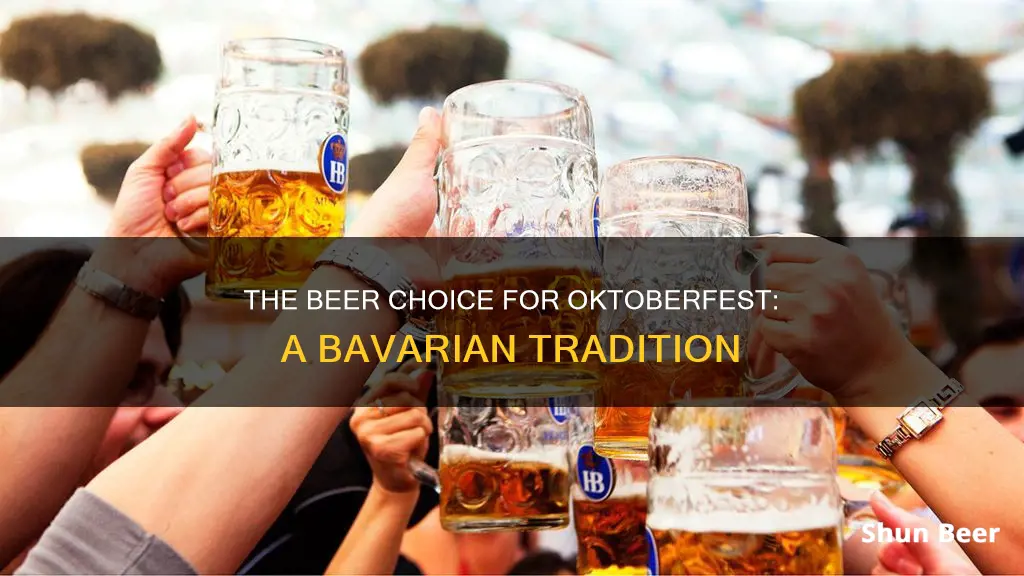
Oktoberfest is a two-week-long festival held every fall in Munich, Germany, to celebrate beer. Only beer from Munich breweries may be served at the festival, and there are only six breweries that can serve beer at the official Oktoberfest festival. These are Augustiner, Hacker-Pschorr, Hofbräu, Löwenbräu, Paulaner, and Spaten. The beers at Oktoberfest are typically German lagers, which can be dark, malt-forward Märzen or lighter, hoppier Festbier.
Beers at Oktoberfest
| Characteristics | Values |
|---|---|
| Number of breweries | 6 |
| Brewery names | Augustiner, Hacker-Pschorr, Hofbräu, Löwenbräu, Paulaner, Spaten |
| Beer type | German lager (Oktoberfestbiers) |
| Beer varieties | Dark, malt-forward Märzen; lighter, hoppier Festbier |
| Alcohol content | Minimum 6% |
| Beer colour | Golden or amber |
| Beer flavour | Bready, grassy, herbal, nutty, sweet, bitter, dry, malty, hoppy |
| Beer freshness | Stored in wooden barrels |
| Serving size | 1-litre steins |
What You'll Learn
- German lager is the most commonly consumed beer at Oktoberfest
- Oktoberfest beers are brewed by one of the Big Six Munich breweries
- All Oktoberfest beers are brewed within the city limits of Munich
- Beers at Oktoberfest are typically served in one-litre steins
- Oktoberfest beers are brewed according to German purity laws

German lager is the most commonly consumed beer at Oktoberfest
Within the family of German-brewed lagers, there are two types: the dark, malt-forward Märzen and the lighter, hoppier Festbier. Today, most festival-goers opt for the second type of lager. It is golden in colour, has a distinct hop flavour, and is less intense than the amber Märzen. However, both types of lager are strong, with alcohol content typically above 6%.
According to tradition, only beer from breweries located within the city limits of Munich can be served at Oktoberfest. The six breweries that produce Oktoberfestbier are Augustiner, Hacker-Pschorr, Hofbräu, Löwenbräu, Paulaner, and Spaten. Each of these breweries has its own unique flavour profile and history, with some dating back to the 14th and 15th centuries. For example, Augustiner, founded in 1328, is Munich's oldest brewery, while Spaten, founded in 1397, is one of the oldest breweries in Germany.
The Oktoberfest beers from these six breweries are served in massive one-litre glasses, contributing to the festive atmosphere of the event. With over seven million litres of beer consumed during the festival, it is clear that German lager is the beverage of choice for those celebrating at Oktoberfest.
Drinking Beer in Public in Rome: What's Allowed?
You may want to see also

Oktoberfest beers are brewed by one of the Big Six Munich breweries
Oktoberfest is a two-week-long festival held every fall in Munich, Germany, to celebrate German beer. The festival attracts more than six million visitors who don lederhosen and dirndls and consume endless bratwurst, pretzels, and beer.
The beers served at Oktoberfest are called Oktoberfestbiers in and around Germany. There are two types: the dark, malt-forward Märzen and the lighter, hoppier Festbier. The majority of the beer consumed at the festival is the second type of lager. It is golden in colour and has a distinct hop flavour. The malt flavour is more biscuit-like and subtle than that of amber Märzen.
In order for a beer to be called an Oktoberfestbier, it must be brewed by one of the six breweries located in the Munich city limits. These breweries are Augustiner, Hacker-Pschorr, Hofbräuhaus, Löwenbräu, Paulaner, and Spaten. Each of these breweries has its own unique history and flavour profile.
Augustiner is one of Munich's oldest breweries, founded in 1328 by the monks of the Augustinian Order. The brewery is renowned for producing Munich's best beer, with a flavour profile that includes light bready malts, caramel, light grasses, and a well-rounded hop profile.
Hacker-Pschorr was formed in 1972 when two of Munich's most successful breweries, Hacker and Pschorr, merged. The beer has a versatile flavour profile, tasting sweet, bitter, dry, malty, and hoppy all at once.
Hofbräuhaus was founded in 1589 by Duke Wilhelm V and has a royal connection—notice the crown on every bottle or mug. The flavour of their beer starts crisp and refreshing, then grows more complex with notes of grain, hay, dough, and bitter noble hops.
Löwenbräu, or "Lion's Brew", is said to be the same beer that was served almost 700 years ago. The flavour is crisp and light-bodied, finishing with a prickly, spicy hop bitterness.
Paulaner is the largest brewery in Bavaria and is known for producing a typical Munich sweet lager. Their beer blends light, toasted malt with a hint of spiced banana and a lemon-hop finish, making it an excellent choice for pairing with food.
Spaten is associated with the most famous brewing family Munich has ever produced, the Sedlmayrs. They introduced the first amber-coloured Märzen-style beer at the 1872 Oktoberfest, which became the Oktoberfest beer we know today. Their beer is crisp and bubbly, with a mild biscuity malt and a grainy, hoppy dryness.
Each of these "Big Six" Munich breweries has its own dedicated tent at the festival, allowing visitors to sample a variety of beers and choose their favourite. The beers are strong, with an alcohol content of up to 6%, and are served in one-litre glasses, making for a lively and festive atmosphere.
Gluten-Free Beer: Enjoy Drinking Without Worry
You may want to see also

All Oktoberfest beers are brewed within the city limits of Munich
Oktoberfest is a German festival held annually in Munich, Bavaria, from mid-September to the first Sunday in October. It is the world's largest Volksfest, featuring a beer festival and a travelling carnival. During the event, large quantities of Oktoberfest Beer are consumed.
All Oktoberfest beers must be brewed within the city limits of Munich. There are six breweries that can serve beer at the official Oktoberfest festival. These breweries are:
- Augustiner
- Hacker-Pschorr
- Hofbräuhaus (or Hofbräu)
- Löwenbräu
- Paulaner
- Spaten
These breweries produce Oktoberfest Beer under specific criteria. The beers must adhere to the Reinheitsgebot, meaning they must contain a minimum of 13.5% Stammwürze (approximately 6% alcohol) and can only contain water, barley, hops, yeast, wheat malt, and/or cane sugar.
Each of these breweries has its own unique history and contributes to the rich tradition of Oktoberfest. For example, Augustiner is one of Munich's oldest surviving breweries, dating back to 1328. On the other hand, Hofbräu has a royal connection, as it was founded by Duke Wilhelm V in 1589.
The beers produced by these breweries vary in flavour and style. For instance, the Hacker-Pschorr beer is known for having a little bit of everything in its flavour profile, including sweet, bitter, dry, malty, and hoppy notes. In contrast, the Paulaner Oktoberfest Bier is a golden, slightly maltier Festbier that is highly drinkable and has become the most-served beer at Oktoberfest in recent years.
The tradition of brewing Oktoberfest Beer within the city limits of Munich adds to the authenticity and local culture associated with the festival. It ensures that the beers served at the event are of the highest quality and adhere to the specific style and taste expected by visitors.
Alcoholics' Favorite Beer: A Surprising Choice Revealed
You may want to see also

Beers at Oktoberfest are typically served in one-litre steins
The Oktoberfest beer, or Oktoberfestbier, is a German lager that is typically served in one-litre steins at the festival. These steins are often glass, but some breweries, such as Augustiner, still use traditional 200-litre wooden barrels, known as "Hirschen", for storage and serving.
The one-litre serving size is quite large, and it is not uncommon for festival-goers to end up drinking several of them. This is perhaps due to the fact that the beers are designed to be easy to drink, with a mild grassy and herbal hop character. However, it is important to remember that these beers are stronger than most other lagers, typically containing more than 6% ABV.
The tradition of serving beer in one-litre steins at Oktoberfest may have originated with the "Steinkrug", traditional stoneware or clay beer vessels that were used at the festival until 1893. These "Steinkrugs" could hold up to one litre of beer and are the source of the term "stein" that is still used today.
In recent years, half-litre steins have also become available at the festival, providing a more manageable serving size for those who don't want to commit to a full litre.
Beer and Blood Donation: What's Safe?
You may want to see also

Oktoberfest beers are brewed according to German purity laws
Oktoberfest is a two-week-long festival held every fall in Munich, the Bavarian capital, to celebrate German beer. The festival attracts more than six million visitors who don lederhosen and dirndls and consume endless bratwurst, pretzels, and beer.
Official Oktoberfest beers are those brewed within Munich's city limits and in accordance with the German Purity Laws, also known as the Reinheitsgebot. This means that the beers must be pure and contain only water, barley, hops, yeast, wheat malt, and/or cane sugar. The law dates back to 1516 and ensures that the beers are clean and free from additives that may cause a worse hangover.
There are six Munich breweries that are official participants in Oktoberfest: Augustiner, Hacker-Pschorr, Hofbräu, Löwenbräu, Paulaner, and Spaten. Each of these breweries has its own unique history and contributes to the festival in its own way. For example, Augustiner is Munich's oldest brewery, founded in 1328 by monks of the Augustinian Order. It is the only brewery that still stores and serves beer from wooden barrels. On the other hand, Hofbräu has a royal connection, as it was founded by Duke Wilhelm V in 1589.
The beers produced by these six breweries vary in terms of flavour and alcohol content. For instance, Augustiner is known for its light bready malts, caramel, light grasses, and well-rounded hop profile, while Hacker-Pschorr offers a mix of sweet, bitter, dry, malty, and hoppy flavours. The alcohol content of the beers ranges from 5.8% to 6.3%, with Hofbräu's Oktoberfest beer being the strongest.
In addition to the official Oktoberfest beers, there are also Oktoberfest-style beers inspired by the festival's history and tradition. These beers are typically Bavarian Märzen, an amber lager with a coppery colour, full-bodied maltiness, and hints of spice and dryness. They are brewed all over the world, including in the USA.
Whether it's an official Oktoberfest beer or an Oktoberfest-style beer, one thing is for sure: at Oktoberfest, everyone is drinking German lager, and it's an experience not to be missed!
Beer and Pantoprazole: Safe Mix or Health Risk?
You may want to see also
Frequently asked questions
German lager, or Oktoberfestbier. Within this lager family, there are two types: the dark, malt-forward Märzen and the lighter, hoppier Festbier.
The beers at Oktoberfest taste like a more flavourful version of American Light Lagers. They have more malt and hop character. Amber Oktoberfest beers, or Märzens, have flavours of toasted bread. The golden lagers poured in the tents have more of a fresh-baked bread flavour from the malt, with mild grassy and herbal notes from the hops.
Only six breweries within Munich city limits are allowed to serve beer at the official Oktoberfest festival. These are Augustiner, Hacker-Pschorr, Hofbräu, Löwenbräu, Paulaner, and Spaten.
The alcohol content of the Oktoberfest beers ranges from 5.8% to 6.3%.







